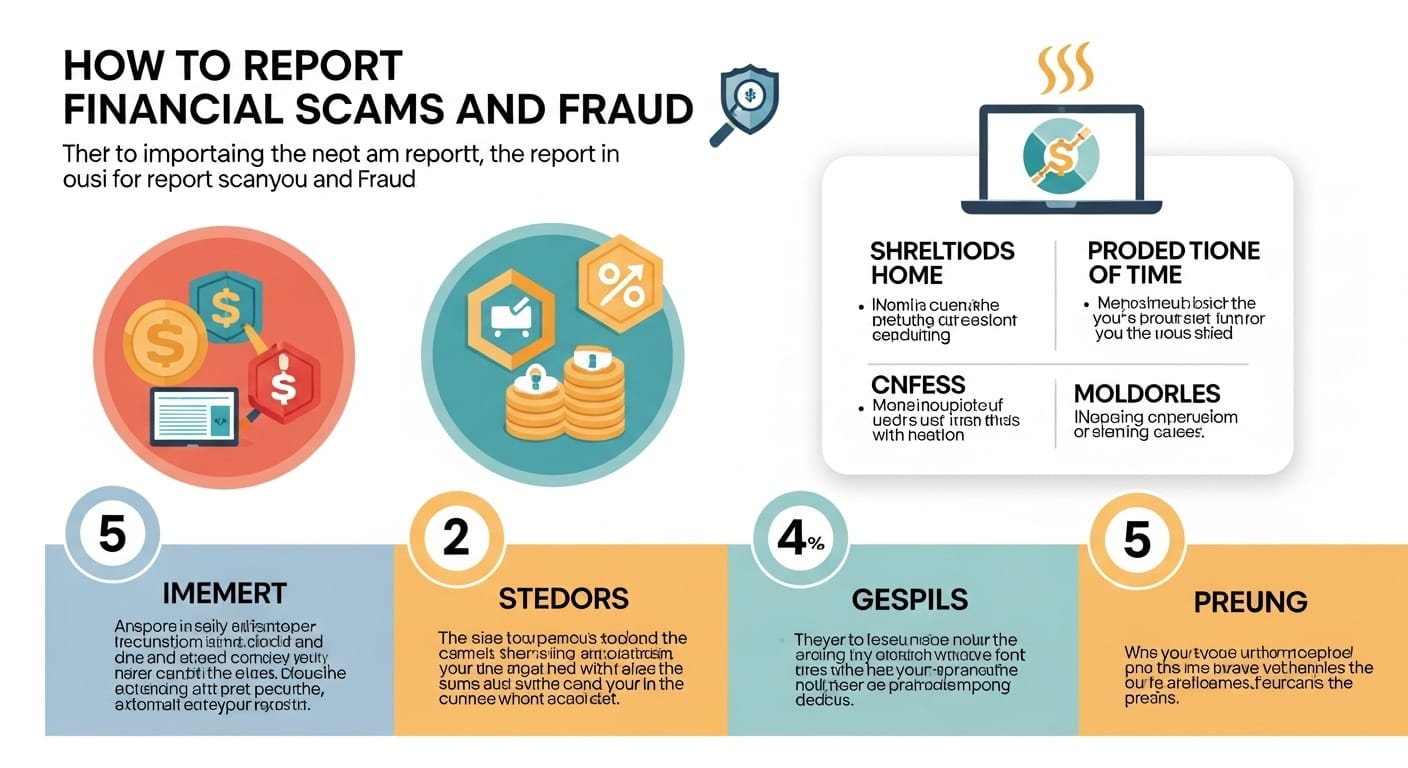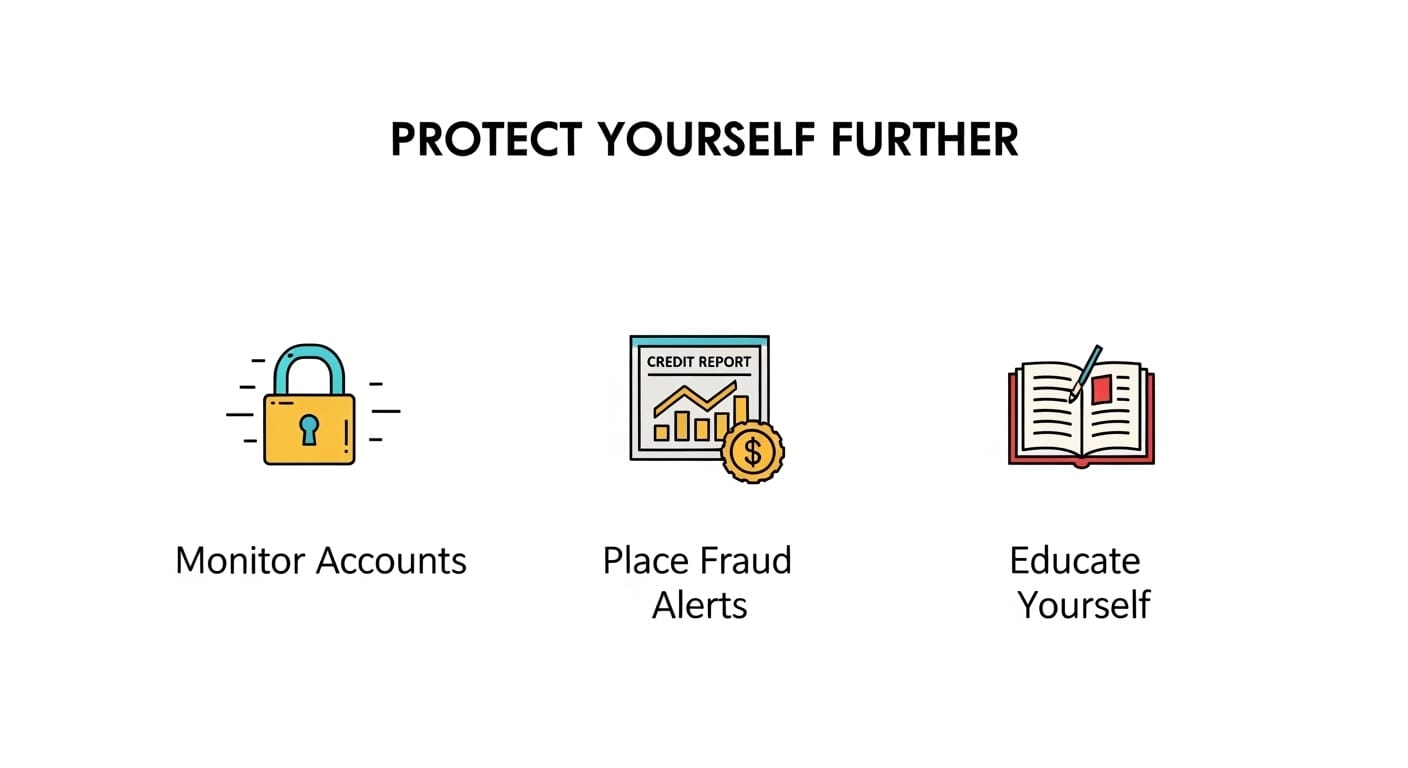We’ve all heard the stories. Someone gets an unsolicited call from a so-called “official” person claiming to be from their bank, or maybe they’ve received an email offering an unbelievable deal on a new car or home, but something just feels off. And, before you know it, the person on the other end has gained access to your finances—or worse, your identity.
Financial scams and fraud are a real issue, but the good news is you can do something about it.
Now, you might be sitting there thinking, “Okay, this is serious, but what exactly do I do if I find myself in a situation where I’ve been scammed?” Don’t panic. Reporting financial scams is a critical step in making sure you stop the fraud in its tracks and protect others from falling victim. Let’s break down exactly how to go about it and what you should know.

Top Takeaways and Key Concepts
Recognize Scams Early: Watch for urgent requests, threats, or personal information demands before acting.
Contact Authorities: Report fraud to the FTC, CFPB, or other relevant agencies immediately.
Gather Evidence: Document all emails, texts, calls, and financial transactions related to the scam.
Notify Financial Institutions: Inform banks or credit card companies to block charges and prevent further losses.
Alert Credit Bureaus: Place fraud alerts or credit freezes to prevent identity theft and new accounts.
Summary of This Article
Please Note: This post may contain affiliate links. If you click one of them, we may receive a commission at no extra cost to you. As an Amazon Associate, I earn from qualifying purchases.
The article explains how to respond effectively after encountering financial scams or fraud. It emphasizes recognizing scams through red flags, reporting incidents to authorities like the FTC or CFPB, and gathering thorough evidence to support claims. Victims should immediately contact banks or credit card companies to block unauthorized transactions and recover funds, and alert credit bureaus to prevent identity theft. Finally, staying informed, monitoring accounts, and sharing experiences helps protect oneself and others from future fraud.
Recognize the Scam Before It’s Too Late

Before you even think about reporting a scam, the first step is recognizing it. And, honestly, that’s not always easy. Scammers are clever—like, too clever—and they can make even the most outrageous offer sound legit. Whether it’s a suspicious email from a fake tech support company or an official-sounding letter from the “IRS” demanding back taxes, they’ve got it down to an art.
So, how do you tell if it’s a scam? One way is by paying attention to red flags like urgent language (“Act now or miss out!”), threats (“You’ll be arrested if you don’t pay today!”), or requests for personal information (e.g., bank account numbers, social security numbers, passwords).
If something feels off—trust that gut feeling. Remember: legit companies don’t need to pressure you into making quick decisions. Always pause and think before you act.
Contact the Right Authorities
Alright, so you’ve realized that you’ve been taken for a ride by one of these scam artists. The next step? Reporting the fraud to the right authorities. You’re not just going to call your mom and vent (well, you can, but that won’t help you get your money back). You need to contact the professionals who can investigate and take action.
In the United States, the Federal Trade Commission (FTC) is your go-to agency for reporting scams. They have an online portal where you can file a report and even check for similar complaints.
There’s also the Consumer Financial Protection Bureau (CFPB) that can help with fraud related to financial products and services. Honestly, if it’s fraud, report it, and if it’s financial fraud—well, the CFPB is your friend here.
Gather Evidence Before Reporting
Before you call in the cavalry, make sure you have all your ducks in a row. This means gathering as much evidence as possible to support your claim. Did you get an email? Screenshot it. A text message? Take a picture. Any phone calls? Write down the details—time, date, the number that called (or better yet, use a call recorder if you’ve got it). The more documentation you can provide, the better your chances are of having your case taken seriously.
By the way, don’t throw away any receipts, checks, or other financial documents that may be tied to the scam. The more you can show that you’ve been scammed, the more the authorities will take your case seriously.
Report to Your Bank or Credit Card Company
Speaking of documentation—if the scam involves your bank account, credit card, or any other financial institution, you need to contact them ASAP. Seriously, don’t wait. Most financial institutions have fraud departments that are well-equipped to help you stop further unauthorized transactions, block fraudulent charges, and even help you recover some of your losses.
If a scammer has gotten their hands on your credit card details, report it immediately to your card issuer, and request a new card. The sooner you act, the more likely it is that your bank can reverse any fraudulent charges. But if you wait too long, well, let’s just say your chances of getting your money back become slimmer than a hairline crack in a window.
Consider Filing a Police Report
Now, here’s the thing: If you’re dealing with a significant amount of fraud or the scam involved identity theft (which, honestly, feels like a violation of your privacy and trust), you may need to file a police report.
Yeah, it’s not something most people think about, but a police report might be necessary if the scam is part of a larger criminal operation or if you need documentation for legal or insurance purposes.
The report will serve as a record of the fraud and can help authorities track down the scammer. It might also help if you need to go to court or dispute charges down the road. In some cases, law enforcement may even be able to help recover stolen assets—though let’s be real: they might not find your money in time for you to go on vacation this year.
Alert the Credit Bureaus
One of the most important steps you can take in response to identity theft is to notify the credit bureaus—Equifax, Experian, and TransUnion. Why? Well, if scammers have managed to access your personal information, they could open new accounts in your name, which can seriously damage your credit score. You’ll want to place a fraud alert or freeze your credit to prevent any new accounts from being opened.
Interestingly enough, fraud alerts and credit freezes are free, and they offer an extra layer of protection that makes it more difficult for scammers to get credit in your name. And once that fraud alert is in place, creditors are legally required to take extra steps to verify your identity before opening a new account.
Stay Informed and Share the Word
So, you’ve reported the fraud. You’ve filed the paperwork, made the calls, and crossed your fingers that everything works out. But your work doesn’t stop there. It’s important to stay vigilant and check your financial statements regularly. Fraud doesn’t just disappear because you reported it.
And here’s another thing: share your experience with others. If you’ve been the victim of a scam, chances are there are others out there who might fall for the same thing. By sharing your story—whether it’s on social media, with friends, or in your community—you can help others avoid the same pitfalls. The more people are aware, the less likely they are to fall prey to fraud.
Resources
How to Report Fraud to the FTC
https://www.consumer.ftc.gov/articles/0300-how-avoid-scam
Reporting Financial Fraud
https://www.consumerfinance.gov/ask-cfpb/how-do-i-report-a-fraud-or-scam-en-109/
How to Protect Yourself from Fraud
https://www.identitytheft.gov/
Frequently Asked Questions
What are common warning signs of financial scams?
Financial scams often involve urgent language, threats, or requests for personal information such as passwords or bank details. Legitimate organizations rarely pressure you to act immediately.
Who should I contact first after discovering financial fraud?
Start by reporting the fraud to the Federal Trade Commission (FTC) and the Consumer Financial Protection Bureau (CFPB). They handle scam investigations and consumer protection cases.
What kind of evidence should I gather before reporting a scam?
Collect emails, screenshots, receipts, call logs, and any related financial documents. The more evidence you provide, the easier it is for authorities to verify and act on your report.
Why should I contact my bank or credit card company immediately?
Informing your bank or card issuer quickly helps block unauthorized charges, freeze compromised accounts, and recover potential losses before further damage occurs.
When should I file a police report for financial fraud?
File a police report if the scam involves significant losses, identity theft, or if official documentation is needed for insurance or legal purposes.
How can credit bureaus help protect against further fraud?
Contact credit bureaus like Equifax, Experian, and TransUnion to place a fraud alert or credit freeze, preventing scammers from opening new accounts in your name.
Why is it important to share your scam experience with others?
Sharing your experience raises awareness, helping others recognize similar scams and avoid becoming victims themselves. Public awareness is key to reducing fraud.

Kevin Collier is a legal expert passionate about simplifying complex legal concepts for everyday individuals. With a focus on providing clear, practical information, he covers a wide range of topics, including rights, responsibilities, and legal procedures. Kevin aims to empower readers with the knowledge they need to navigate the legal landscape confidently, ensuring they can make informed decisions regarding their legal matters. Through insightful articles and easy-to-understand resources, he helps demystify the law, making it accessible to all.










